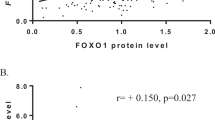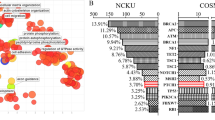Abstract
The p53 tumour-suppressor gene is important in the regulation of cell growth and apoptosis, and loss of functional wild-type activity may be associated with tumour formation and resistance to therapy. Differentiation of functionally normal wild-type protein from mutant or abnormal protein remains difficult using either immunohistochemical assays or mutational DNA sequencing. p21(WAF1/CIP1) (p21) is induced by wild type p53 and plays an important role in promoting cell cycle arrest. To test the hypothesis that p21 protein expression may act as a downstream marker of tumours from patients with locally advanced breast cancer before treatment with doxorubicin, pretreatment p53 status had been characterized in 63 tumours by p53 protein immunostaining and DNA mutational analysis. There was a significant association between immunostaining for p53 and the presence of p53 mutations (P = 0.01). Of 56 patients available for determination of p21, 31 (55%) expressed p21 protein. Twenty-eight out of 31 patients (90%) positive for p21 had low negative p53 protein expression, whereas only 3 of 13 patients (23%) with high p53 expressed p21 (P = 0.009). No association was seen between p21 protein expression and p53 mutations (P = 0.24). The combination of p53 and p21 immunostaining results improved the specificity of the immunostaining but at a cost of significant reduction in sensitivity. Immunohistochemical assessment of p21 protein expression is inversely associated with abnormal p53 protein in human breast cancer. The detection of p21 protein expression in combination with p53 protein expression did not improve the ability of immunohistochemistry (IHC) to differentiate between normal and mutant p53 protein.
This is a preview of subscription content, access via your institution
Access options
Subscribe to this journal
Receive 24 print issues and online access
$259.00 per year
only $10.79 per issue
Buy this article
- Purchase on Springer Link
- Instant access to full article PDF
Prices may be subject to local taxes which are calculated during checkout
Similar content being viewed by others
Author information
Authors and Affiliations
Rights and permissions
About this article
Cite this article
Ellis, P., Lonning, P., Borresen-Dale, A. et al. Absence of p21 expression is associated with abnormal p53 in human breast carcinomas. Br J Cancer 76, 480–485 (1997). https://doi.org/10.1038/bjc.1997.413
Issue Date:
DOI: https://doi.org/10.1038/bjc.1997.413
This article is cited by
-
c-Myc induced the regulation of long non-coding RNA RHPN1-AS1 on breast cancer cell proliferation via inhibiting P53
Molecular Genetics and Genomics (2019)
-
p21/WAF1 expression in human colorectal carcinoma: association with p53, transcription factor AP-2 and prognosis
British Journal of Cancer (1999)
-
Cyclin E dependent kinase activity in human breast cancer in relation to cyclin E, p27 and p21 expression and retinoblastoma protein phosphorylation
Oncogene (1999)
-
Proliferation- and apoptosis-associated factors in advanced prostatic carcinomas before and after androgen deprivation therapy: prognostic significance of p21/WAF1/CIP1 expression
British Journal of Cancer (1999)



